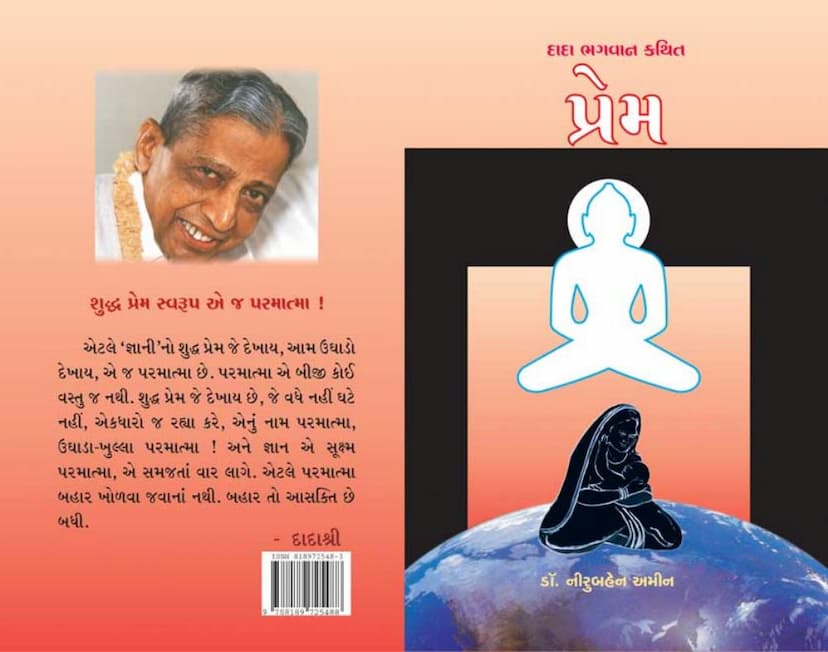Prem
Added to library: September 2, 2025

Summary
Here's a comprehensive summary of the Jain text "Prem" by Dada Bhagwan, based on the provided pages:
Book Title: Prem (Love) Author: Dada Bhagwan (as narrated and compiled by Dr. Niruben Amin) Publisher: Dada Bhagwan Foundation
Core Message:
The central theme of "Prem" is to redefine and explain the true nature of love, distinguishing it from worldly attachments, desires, and ego. Dada Bhagwan, through his teachings, clarifies that true, pure love is synonymous with the state of the Self (the Soul) and is the very essence of God (Parmatma).
Key Concepts and Distinctions:
-
True Love vs. Attachment (Aasakti): The book extensively differentiates between genuine love and worldly attachment. True love is described as unchanging, unwavering, and unconditional. It neither increases nor decreases, remaining constant. Anything that fluctuates, that arises and subsides, is defined as attachment (aasakti). Attachment is driven by desires, expectations, and the ego ("I" and "mine").
-
Unconditional Love (Ahetuki Prem): The true essence of love is its purposelessness. It is not based on any benefit or return. For example, praying to God with the expectation of fulfilling desires is not true love for God; it's still rooted in self-interest. Dada Bhagwan emphasizes that He loves everyone without any ulterior motive.
-
The Nature of Worldly Love: The book uses numerous examples to illustrate how what people call "love" in the world is actually a form of attachment.
- Parental Love: Even the love of a mother for her child is analyzed. While considered the highest form of worldly love, it is still seen as rooted in moh (infatuation/attachment) and the expectation of care and support in return. The bond is based on the child being born from the mother's body and consuming her nourishment. This attachment can fracture if the child behaves in ways that displease the mother.
- Marital Love: The love between husband and wife is described as attachment, driven by mutual need and benefit. When these needs or benefits change, the "love" can waver or disappear. The idea of "husband" and "wife" is seen as a worldly designation, and a more neutral term like "companion" is suggested to reduce attachment.
- Love for God: True love for God doesn't stem from asking for favors or feeling fear. It arises from experiencing God's presence within and receiving inner bliss.
-
Love is Unconditional and Non-Judgemental: True love sees no fault in the other person. Whether someone offers flowers or abuses, the love remains the same. It is not affected by external actions or words. This is exemplified by Dada Bhagwan's own nature, where he accepts criticism without getting upset because he sees the interaction as a recording playing out.
-
Love is Not Emotionalism: The book strongly distinguishes true love from emotional outbursts. Emotional reactions are seen as attachments and can lead to negative karma. True love is described as calm, stable, and rooted in the Self, not in superficial feelings. The analogy of a train being emotional and causing an accident illustrates the danger of uncontrolled emotions.
-
The Self as the Source of True Love: The ultimate source of pure, unchanging love is the Self (the Soul). When one realizes their true nature as the Soul, they become inherently loving and unaffected by worldly circumstances. This self-realization is achieved through the "Akram Vignan" (the path of Self-Realization) as taught by Dada Bhagwan.
-
The Role of Knowledge (Gnan): Knowledge of the Self is the key to understanding and experiencing true love. While the Self (Atma) is inherently loving, it is hidden by ego and ignorance. When this knowledge is received, one begins to see their true nature and the illusion of worldly attachments.
-
Love as God (Parmatma): The book posits that the true, unchanging love experienced by the Self is God (Parmatma). It is not something to be sought outside but is realized within.
-
The Nature of the Gnani Purush: The Gnani Purush (the Enlightened One) embodies this pure love. Their love is constant, unconditional, and serves the ultimate welfare of all beings. They possess the ability to see the Self in everyone and act accordingly. Their love is not a temporary emotion but an intrinsic quality of their realized state.
-
Distinguishing Moh (Infatuation) from Prem (Love):
- Moh: Blind attachment, driven by external appearances and expectations of personal gain. It is temporary and can lead to suffering. Moths are attracted to a flame and get destroyed; similarly, people entangled in moh are destroyed by it.
- Prem: True, unchanging, unconditional love. It is the state of the Self and leads to liberation.
-
The Path to True Love:
- Self-Realization: Gaining knowledge of the Self through a Gnani.
- Living by the Gnani's Teachings: Following the principles and commands given by the Gnani.
- Detachment from Attachments: Gradually releasing worldly attachments by recognizing them as illusions.
- Seeing the Self in All: Recognizing the presence of the Soul in everyone, thereby dissolving the sense of separateness.
Practical Implications:
The teachings in "Prem" offer a profound shift in understanding relationships and life itself. It encourages:
- Observing without Judgment: To see others without finding fault, recognizing that actions are often driven by past karma.
- Detaching from Outcomes: To perform duties without being attached to the results.
- Cultivating Inner Peace: To find happiness and contentment within the Self, rather than seeking it from external sources.
- Developing a Universal Love: To extend the same unwavering love to everyone, regardless of their actions or behavior.
Conclusion:
"Prem" by Dada Bhagwan is a spiritual guide that aims to liberate readers from the pain and suffering caused by misguided worldly affections. It reveals that the ultimate goal and the true nature of existence is pure, unconditional love, which is identical to God. By understanding and living these principles, one can achieve liberation and experience the bliss of the Self.